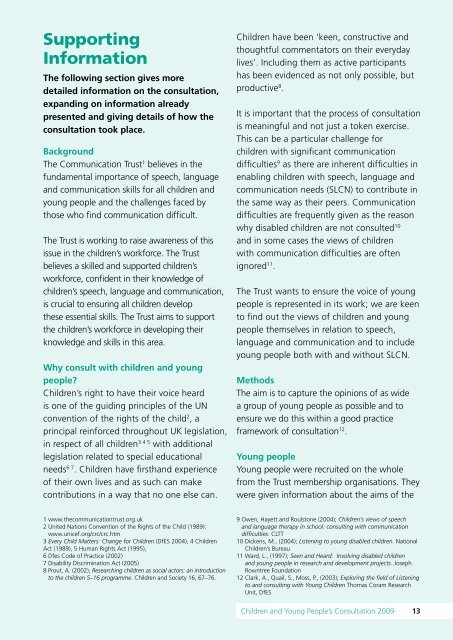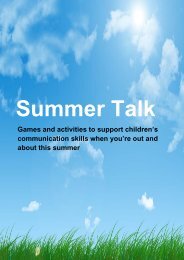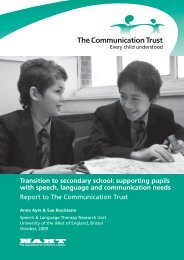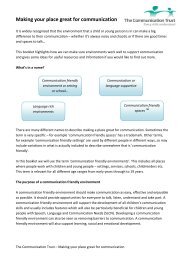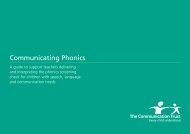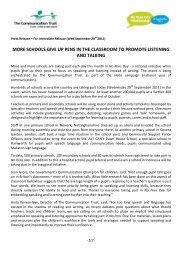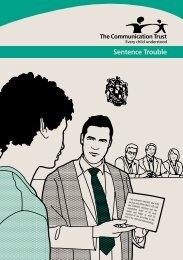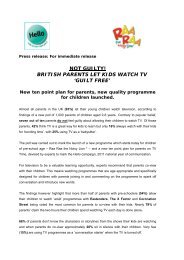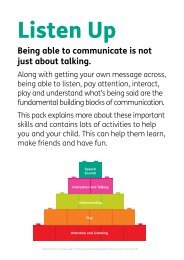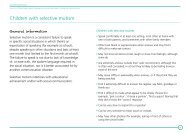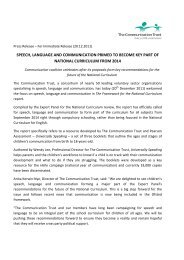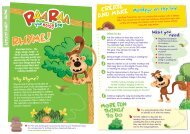What do children and young people think about speech ... - Afasic
What do children and young people think about speech ... - Afasic
What do children and young people think about speech ... - Afasic
- No tags were found...
You also want an ePaper? Increase the reach of your titles
YUMPU automatically turns print PDFs into web optimized ePapers that Google loves.
SupportingInformationThe following section gives moredetailed information on the consultation,exp<strong>and</strong>ing on information alreadypresented <strong>and</strong> giving details of how theconsultation took place.BackgroundThe Communication Trust 1 believes in thefundamental importance of <strong>speech</strong>, language<strong>and</strong> communication skills for all <strong>children</strong> <strong>and</strong><strong>young</strong> <strong>people</strong> <strong>and</strong> the challenges faced bythose who find communication difficult.The Trust is working to raise awareness of thisissue in the <strong>children</strong>’s workforce. The Trustbelieves a skilled <strong>and</strong> supported <strong>children</strong>’sworkforce, confident in their knowledge of<strong>children</strong>’s <strong>speech</strong>, language <strong>and</strong> communication,is crucial to ensuring all <strong>children</strong> developthese essential skills. The Trust aims to supportthe <strong>children</strong>’s workforce in developing theirknowledge <strong>and</strong> skills in this area.Why consult with <strong>children</strong> <strong>and</strong> <strong>young</strong><strong>people</strong>?Children’s right to have their voice heardis one of the guiding principles of the UNconvention of the rights of the child 2 , aprincipal reinforced throughout UK legislation,in respect of all <strong>children</strong> 3 4 5 with additionallegislation related to special educationalneeds 6 7 . Children have firsth<strong>and</strong> experienceof their own lives <strong>and</strong> as such can makecontributions in a way that no one else can.Children have been ‘keen, constructive <strong>and</strong>thoughtful commentators on their everydaylives’. Including them as active participantshas been evidenced as not only possible, butproductive 8 .It is important that the process of consultationis meaningful <strong>and</strong> not just a token exercise.This can be a particular challenge for<strong>children</strong> with significant communicationdifficulties 9 as there are inherent difficulties inenabling <strong>children</strong> with <strong>speech</strong>, language <strong>and</strong>communication needs (SLCN) to contribute inthe same way as their peers. Communicationdifficulties are frequently given as the reasonwhy disabled <strong>children</strong> are not consulted 10<strong>and</strong> in some cases the views of <strong>children</strong>with communication difficulties are oftenignored 11 .The Trust wants to ensure the voice of <strong>young</strong><strong>people</strong> is represented in its work; we are keento find out the views of <strong>children</strong> <strong>and</strong> <strong>young</strong><strong>people</strong> themselves in relation to <strong>speech</strong>,language <strong>and</strong> communication <strong>and</strong> to include<strong>young</strong> <strong>people</strong> both with <strong>and</strong> without SLCN.MethodsThe aim is to capture the opinions of as widea group of <strong>young</strong> <strong>people</strong> as possible <strong>and</strong> toensure we <strong>do</strong> this within a good practiceframework of consultation 12 .Young <strong>people</strong>Young <strong>people</strong> were recruited on the wholefrom the Trust membership organisations. Theywere given information <strong>about</strong> the aims of the1 www.thecommunicationtrust.org.uk2 United Nations Convention of the Rights of the Child (1989):www.unicef.org/crc/crc.htm3 Every Child Matters: Change for Children (DfES 2004), 4 ChildrenAct (1989), 5 Human Rights Act (1995),6 Dfes Code of Practice (2002)7 Disability Discrimination Act (2005)8 Prout, A. (2002); Researching <strong>children</strong> as social actors: an introductionto the <strong>children</strong> 5–16 programme. Children <strong>and</strong> Society 16, 67–76.9 Owen, Hayett <strong>and</strong> Roulstone (2004); Children’s views of <strong>speech</strong><strong>and</strong> language therapy in school: consulting with communicationdifficulties. CLTT10 Dickens, M., (2004); Listening to <strong>young</strong> disabled <strong>children</strong>. NationalChildren’s Bureau11 Ward, L., (1997); Seen <strong>and</strong> Heard: Involving disabled <strong>children</strong><strong>and</strong> <strong>young</strong> <strong>people</strong> in research <strong>and</strong> development projects. JosephRowntree Foundation12 Clark, A., Quail, S., Moss, P., (2003); Exploring the field of Listeningto <strong>and</strong> consulting with Young Children Thomas Coram ResearchUnit, DfESChildren <strong>and</strong> Young People’s Consultation 2009 13


